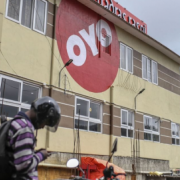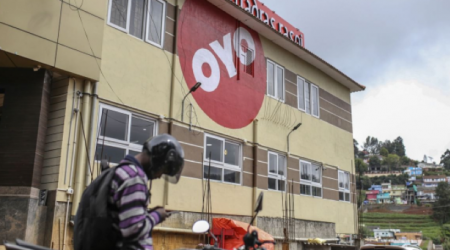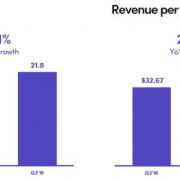The Death of the Gig Economy
The demise of the gig economy is upon us.
That is the latest takeaway from a slew of negative news overflowing the news wires lately.
As many of you know, I hate this niche of tech with a passion, and it has been discovered as nothing more than a marginal fly-by-night sub-sector passing off the cost of employees and their wages to the investor.
They also contribute no meaningful technology that moves the needle.
When the hammer fell on Adam Neumann’s WeWork, the hammer fell equally as hard on the gig economy business model that brought public markets the likes of Uber and Lyft.
The path to venture capitalist’s cashing in abruptly closed off was the end development to all this mayhem.
So I was not surprised when online food deliverer Grubhub (GRUB) had a dead cat bounce after rumors of them looking for a sale to their badly run company.
Then last Friday was the day the chickens came home to roost with Grubhub shares cratering over 8%.
If there is a sale, at what heavily discounted price will it go for?
We could see a marked down shell of its former self.
Grubhub naturally came out and rejected the notion that they are about to be sold off.
Where there is smoke – there is fire.
They did, however, admit they are in the process of “consulting” about certain acquisitions which could mean purchasing inorganic growth to juice up their numbers ahead of a sale.
There are four market leaders who control roughly 80% of the food delivery service business.
But the food war is far from over as competitors undercut each other time after time.
Competition in the food delivery market is driving down the unit economics of online food delivery to a nadir at a time when they can least afford it.
The other three involved are Uber Eats division of Uber (UBER) as well as Postmates and DoorDash.
Grubhub mentioned that there will likely be opportunities to acquire market share, but at what cost?
Acquiring inorganic revenue is at peak cost in 2020.
Cost per unit matters more now than any other time in the past 10 years boding ill for Grubhub and its competition.
And until they adequately address the unit economics in detail, readers must assume that Grubhub is on a suicide mission and you won’t know how close they are to the end until there is a dramatic announcement describing it.
The big takeaway here is that conditions are ripe for consolidation in the online delivery business.
As we go further out on the risk curve, private unicorns are in dire straits too.
Taking a barometer of this subsector allows investors to digest the level of risk premium in the overall markets that can be applied to safer parts of the tech ecosphere through extrapolation techniques.
Venture capitalist Masayoshi Son is infamous for overpaying a slew of tech growth firms and in 2020, so far, it has not been kind to him.
Oyo allows customers to book hotel rooms in more than 80 countries through its app.
It even converts struggling local hotels into Oyo franchises, puts up some money to remodel the interior, and takes commission on every booking.
The startup is dumping 5% of its staff in China and another 12% of employees in India, as part of a reorganization.
Oyo is the third company in SoftBank's portfolio to shed jobs in a week, following the layoffs at robotic pizza startup Zume and car rental company Getaround.
Oyo has sucked in more than $3 billion in capital and the last insane tranche of investment values the company at more than $10 billion.
SoftBank has been throwing money at the company since 2015.
The firm is otherwise known as the "SoftBank's jewel in India" for being one of the country's most valuable private companies.
However, there has been a recent barrage of sub-optimal reports suggesting they have accelerated sales by underhanded business practices.
A peek into the firm showed explicit evidence that Oyo rented thousands of rooms at unlicensed hotels and guesthouses then allowing police and other officials use the service for free to avoid trouble with the authorities.
The pain for Softbank doesn’t just stop at Oyo, Rappi has been dragged down as well.
The Latin American delivery startup is laying off 6% of its workforce, less than a year after Japan’s SoftBank Group pumped in nearly $1 billion in the company.
Softbank is putting pressure on local management to trim the fat off their models and forcing them to become profitable now.
Rappi has expanded to nine countries since its founding in 2015.
It plans to be the swiss army knife of online deliveries by getting into groceries, restaurant meals, medication, furniture, and has even foolishly branched out into scooter rental, travel, and basic banking services.
Softbank plans to pour another $4 billion into South American startups but one must beg to ask, are they throwing good money on top of bad money?
Certainly seems so.
When asked how soon Rappi would turn in a profit, co-founder Sebastian Mejia was adamant that his sole priority was to grow fast, and that investors were on board with the plan.
This is code name for NEVER!
Softbank and its vision fund are set for more death by a thousand cuts in 2020, and being in the wrong place at the wrong time aggravates the mess they find themselves in.
Short all companies reliant on gig economy workers in the public markets and prepare for a gloomy IPO pipeline that will last through the end of 2020.





